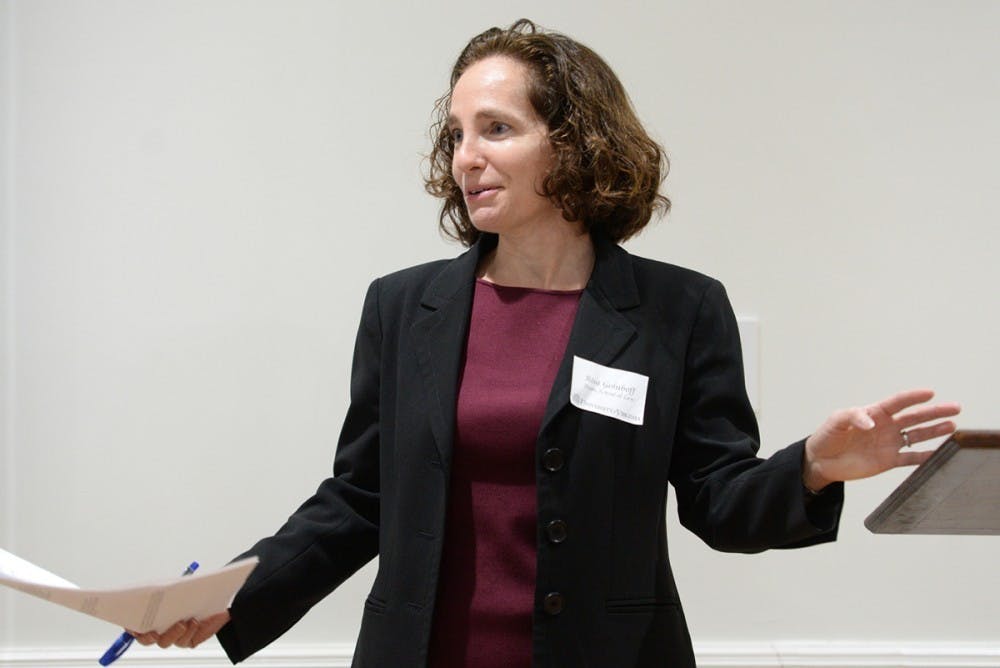The University Democrats hosted Law School Dean Risa Goluboff Wednesday night in the Physics Building for a discussion on free speech and racial equality on Grounds. Goluboff — chair of the Deans Working Group — discussed a recent policy recommendation that would regulate the expression of groups and individuals on Grounds who are unaffiliated with the University.
The Deans Working Group was formed by University President Teresa Sullivan after the events of Aug. 11 and 12 when white nationalists marched on the Lawn and held the deadly Unite the Right rally in downtown Charlottesville the following day. The group is tasked with evaluating the University’s response to the events and proposing changes to current policy structures.
The group held a student feedback session last week on proposed policy changes that would limit the ability of individuals unaffiliated with the University — those who are not University students, faculty or staff — to gather on Grounds. The regulations would create a list of designated spaces where such unaffiliated persons can gather, limit the number of attendees and require advanced reservation of spaces during specific hours of the work week for set lengths of time.
“[The proposed policy] is in place as a mechanism to protect us against future events, like the August 11 and 12 events,” Goluboff said.
Mary Alice Kukoski, a second-year College student and University Democrats president, similarly said she sees the new policies as a reaction to the events of August and a positive movement toward preventing them from reoccurring.
“They took a look at the policies and realized there was nothing in place to stop this, so I think putting these policies in action is a step in the right direction,” Kukoski said.
Goluboff gave a brief overview of the proposed policy changes before opening the floor to student questions concerning the policy.
“I am sure many of you wondered, as I wondered, what are the rules?” Goluboff said to an audience of close to 20 students.
Currently, unaffiliated persons or groups, including alumni, can only use University facilities if invited by student organizations. Student organizations themselves may reserve academic spaces for various activities. Affiliated persons — including students, faculty and staff of the University — can also currently use outdoor University property for “expressive activity, including peaceful demonstration and protests.”
Kukoski said she favors the proposed policy changes and how it would protect students and individuals affiliated with the University.
“I think it is in the best interest of students,” Kukoski said. “Obviously, they have drawn a very clear divide between unaffiliated and affiliated parties, which I think is really important … At the end of the day, the policy is to really protect students and affiliated persons to the University.”
The majority of the meeting was student questions concerning the policy and its potential implications. Goluboff acknowledged that the policy will be subject to continuous revision based on input from students and faculty members.
“We are walking around trying to hear what everyone thinks about this. We really want to hear your thoughts,” Goluboff said. “This is our attempt to find some middle ground.”
Goluboff said the drafted policy mirrors a similar policy implemented by the University of Maryland regarding access by unaffiliated groups. The University of Maryland policy also establishes designated locations for unaffiliated individuals to gather, referred to as “public forums.” According to the University of Maryland’s policy, public speaking is limited to one public forum on their campus — the Nyumburu Amphitheater stage — while the distribution of literature is limited to sidewalk space outside of the Stamp Student Union. U.Va., on the other hand, is considering multiple designated locations for its proposed policy change.
Another concern was the gray area between verbal and physical threats and how unaffiliated counter-protests may be impacted by the proposed policy updates. Students also raised questions on what constitutes “disruption.” In the policy draft, unaffiliated groups cannot “disrupt” University functions, though the word “disrupt” is not clearly defined.
Goluboff continued to explain that the hope from the policy change would be the anticipatory abilities of the University.
“If the University can anticipate, then the University can be prepared to act in response,” Goluboff said.
Ellie Brasacchio, a second-year College student and chair of the Student Council Representative Body, said she wants to engage more students in the discussion over the proposed policy. She said she is considering involving Student Council more with the deliberation process.
“I actually just asked Dean Goluboff if she would speak at a Student Council meeting,” Brasacchio said. “I could forsee a lot of people coming and voicing their concerns … With this working group, I think it would be very beneficial for students to know what’s going on.”
As the policy continues to be updated and revised, Goluboff hopes that it will become more clear and definitive on how unaffiliated and affiliated members interact with the University.





